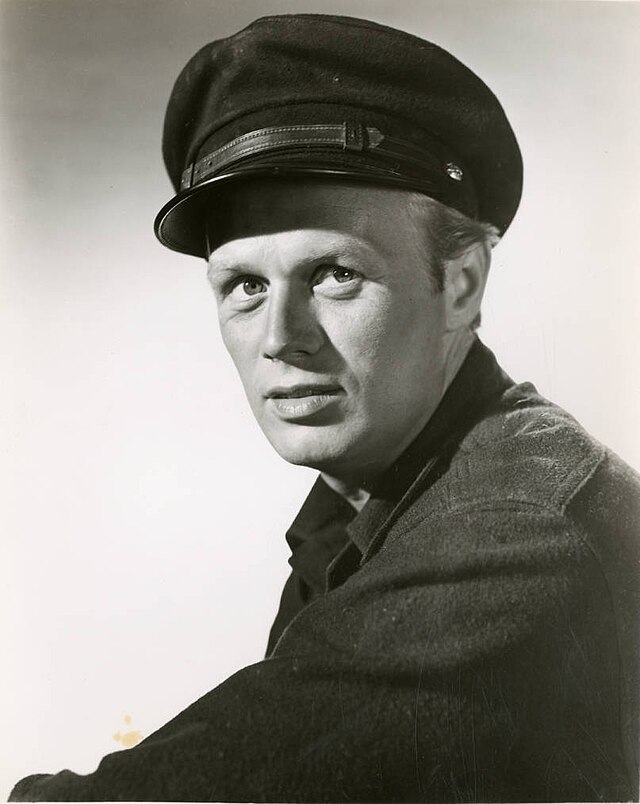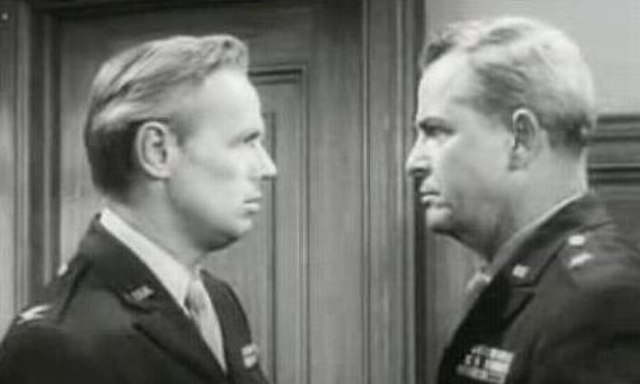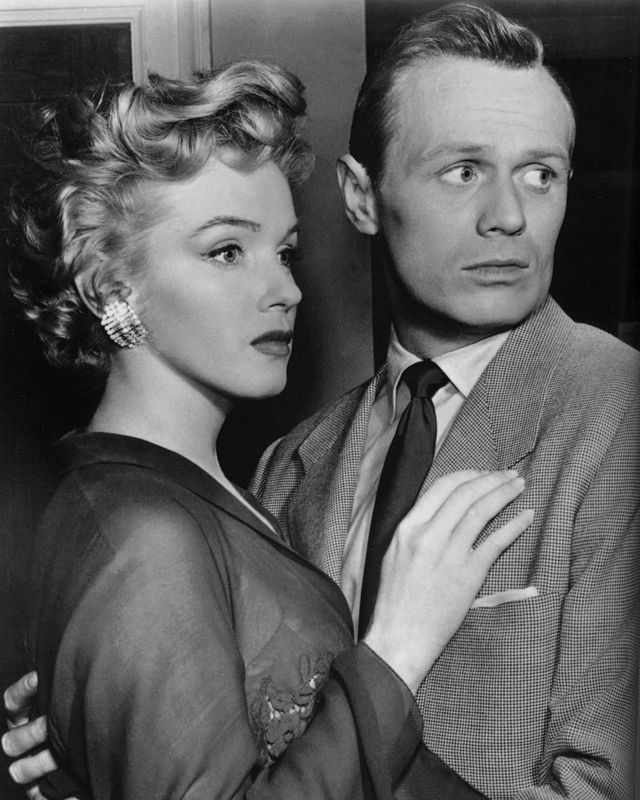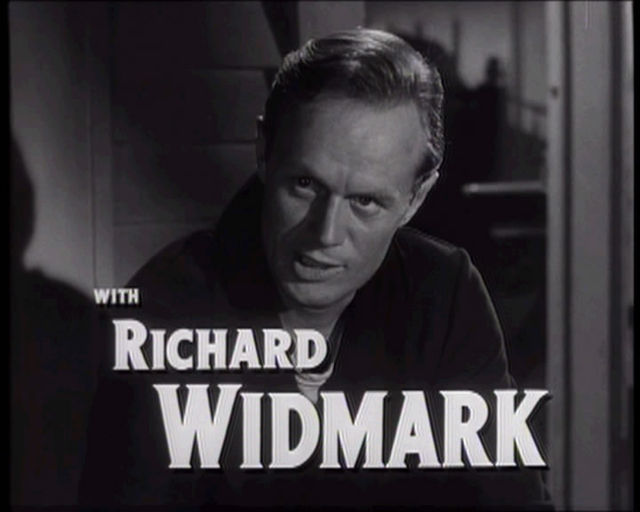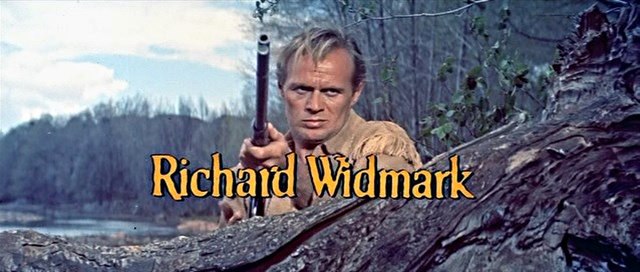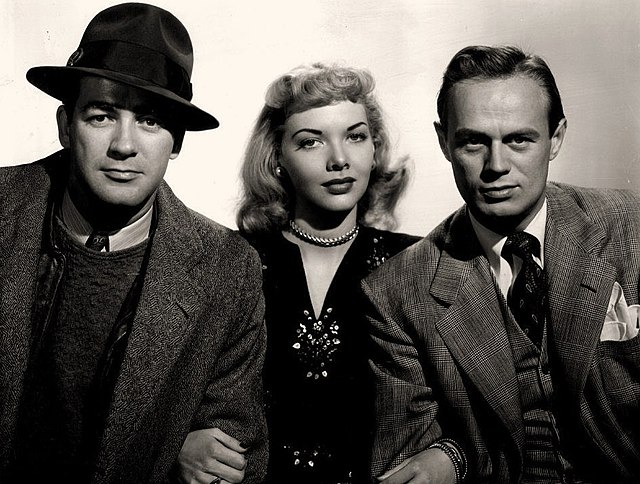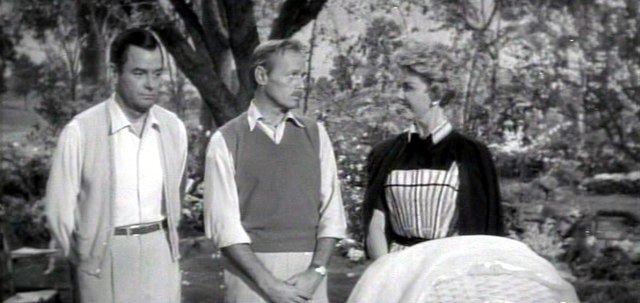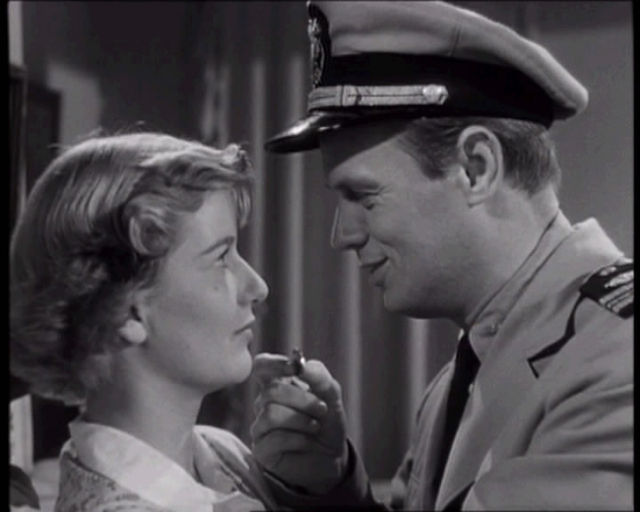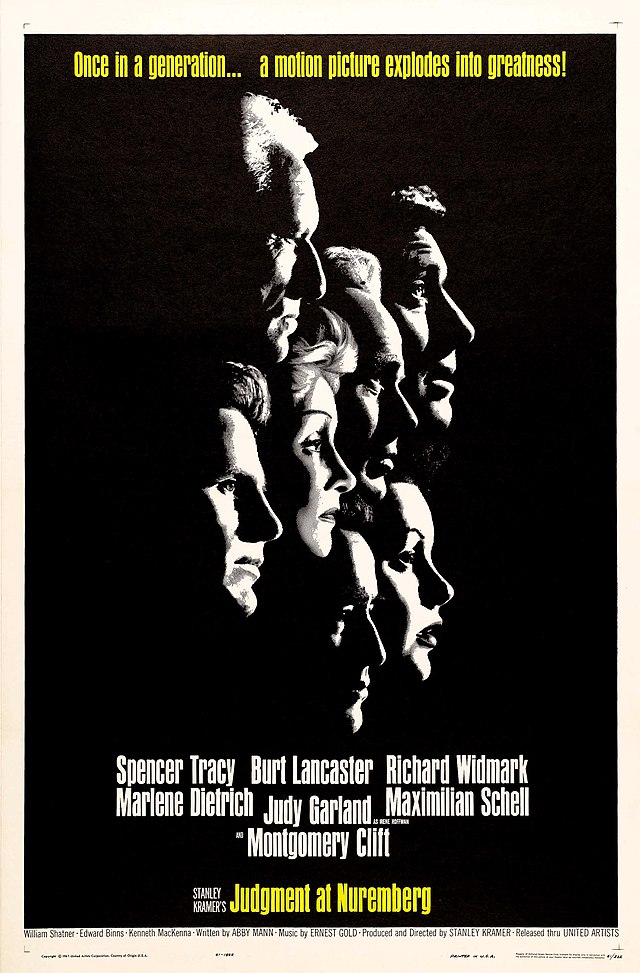Richard Widmark
back| Full Name | Richard Weedt Widmark |
| Stage Name | Richard Widmark |
| Born | December 26, 1914 |
| Birthplace | Sunrise Township, Chisago County, Minnesota, USA |
| Died | March 24, 2008 |
| Buried | Roxbury Center Cemetery, Roxbury, Connecticut, USA |
| Married to | Jean Hazlewood (1942–1997, her death) - Susan Blanchard (1999–Widmark’s death in 2008) |
| Children | One daughter, Anne Heath Widmark |
| Notable films | Kiss of Death (1947) - Night and the City (1950) - No Way Out (1950) - Judgment at Nuremberg (1961) - How the West Was Won (1962) |
Richard Widmark
The Unlikely Antihero of Hollywood
Richard Widmark was one of Hollywood's notable film noir stars, known for his intensity and versatility. He made a strong impression in his film debut in "Kiss of Death," with a chilling portrayal that established him as a significant talent.
Though frequently cast as villains early in his career, he later took on heroic and complex roles, solidifying his reputation as a diverse actor.
Related
Richard Widmark (1914 – 2008)
Biography and Movie Career
Richard Widmark was a revered figure in Hollywood known for his dynamic and chilling portrayals, especially in film noir. His career spanned nearly six decades, and his journey to stardom was marked by a combination of raw talent, determination, and a unique intensity that captivated audiences from his earliest roles.
Early Life and Personal Background
Richard Weedt Widmark was born on December 26, 1914, in Sunrise Township, Chisago County, Minnesota, to Carl Henry Widmark, a traveling salesman, and Ethel Mae Widmark. He was of Swedish descent, and his childhood was a peripatetic one, as his family frequently moved across the Midwest. These constant relocations made young Richard somewhat introspective, and he found solace in books and films. An avid moviegoer, he idolized stars like Spencer Tracy and Charles Boyer, who inspired him to consider acting as a possible career.
Widmark attended Lake Forest College in Illinois, where he studied acting and gained his first experiences on stage. Though he initially studied law, he found himself increasingly drawn to drama classes. His involvement in college theater productions was formative, and he eventually graduated in 1936 with a degree in speech. His professors and peers noticed his innate ability to portray complex characters with intensity and intelligence, and he soon decided to pursue acting professionally.
Early Career and Rise to Fame
After college, Widmark worked as a radio actor and appeared in various stage productions. He spent several years on the radio, lending his voice to various dramas, which helped him hone his skills in timing and emotional expression. He made his Broadway debut in 1943 in Kiss and Tell, where he quickly caught the eye of Hollywood talent scouts.
In 1947, 20th Century Fox cast him in his first movie role, Kiss of Death, a crime thriller that marked his breakout as an actor. Playing the psychopathic gangster Tommy Udo, Widmark delivered a chilling performance that instantly made him a star. His maniacal, icy laugh and cruel demeanor shocked audiences and garnered him an Academy Award nomination for Best Supporting Actor. This role launched his career and cemented his place in Hollywood as a leading figure in film noir and crime dramas. Though he was initially typecast as villains, his talent soon allowed him to branch out into more heroic and nuanced roles.
Hollywood Success and Iconic Roles
Widmark went on to star in numerous iconic films, including Night and the City (1950), where he played the desperate hustler Harry Fabian, and Panic in the Streets (1950), a thriller where he portrayed a doctor fighting to prevent an outbreak in New Orleans. His roles were often morally ambiguous, and his ability to convey complex emotions made him one of Hollywood’s most versatile actors.
In No Way Out (1950), he starred opposite Sidney Poitier as a racist thug—a role that broke ground in addressing racial tensions on screen. Widmark received praise for his willingness to tackle such a controversial role, and he was respected for his commitment to the part, despite its negative aspects. His performance in Pickup on South Street (1953), where he played a petty thief embroiled in Cold War espionage, solidified his reputation in film noir and showcased his talent for blending menace with charm.
Widmark transitioned smoothly into Westerns, appearing in classics like Broken Lance (1954) and The Alamo (1960), where he played Jim Bowie alongside John Wayne. His performance as a prosecutor in Judgment at Nuremberg (1961) demonstrated his range, as he portrayed a dedicated lawyer in one of the era’s most important films. Widmark also starred in Madigan (1968), a gritty police drama that was popular enough to inspire a short-lived television series.
Personal Life and Passions
Outside of his acting career, Widmark led a relatively private life, especially compared to many of his contemporaries. He married screenwriter Jean Hazlewood in 1942, and the couple had a daughter, Anne Heath Widmark. Jean was a stabilizing influence on Widmark, and their marriage lasted until her death in 1997. After her passing, Widmark married Susan Blanchard, the ex-wife of Henry Fonda, in 1999, and they remained together until his death.
Widmark was known for his intellect and quiet demeanor off-screen, in contrast to the intense characters he portrayed. He was deeply interested in politics and supported progressive causes, including civil rights and anti-McCarthyism. A firm believer in individual rights and freedoms, Widmark spoke out against the blacklist era in Hollywood, a time when many in the industry were shunned for their political beliefs. He was also passionate about history and nature, often spending time reading or enjoying the outdoors.
Later Years and Legacy
In the later part of his career, Widmark began to focus on television roles, including appearances in shows like Madigan, where he reprised his role as the gritty detective. He gradually withdrew from Hollywood in the 1980s, preferring the quiet life he had always enjoyed. Nevertheless, his influence remained strong, and he was regarded as an icon of the film noir genre.
Widmark’s contribution to film was recognized by his peers and film historians alike. He left a legacy as a unique, unglamorous star whose talent and dedication to his craft were his most defining features. Known for his meticulous preparation and understated approach, he inspired many actors who came after him, especially those in the thriller and crime genres.
Death and Cause of Death
Richard Widmark passed away on March 24, 2008, at the age of 93 in his home in Roxbury, Connecticut. He had been in declining health for some time and suffered from a fall, which exacerbated his condition. He was laid to rest in Roxbury Center Cemetery, Connecticut, next to his first wife, Jean Hazlewood.
Final Thoughts on His Legacy
Richard Widmark’s life and career were defined by a unique blend of intensity, intelligence, and integrity. He broke ground in Hollywood by taking on challenging roles, often as complex anti-heroes or villains, while balancing his personal convictions and private nature with his public persona. His dedication to acting and his impact on the film noir genre have left an indelible mark on Hollywood, ensuring that his legacy endures for future generations.
Richard Widmark Salute to Sidney Poitier
Key Elements of Widmark's Acting Style
• Understated Intensity
Widmark’s performances were marked by a quiet but powerful intensity. He rarely overacted or displayed overtly dramatic gestures, relying instead on subtle cues that hinted at a character’s deeper feelings. This approach made him especially compelling in roles that demanded a sense of psychological tension, as his restraint added to the suspense. In films like Kiss of Death, where he played the psychopathic Tommy Udo, Widmark used a restrained smile and a chilling laugh to convey cruelty, making the character even more terrifying.
• Complexity in Villainous Roles
Widmark had a remarkable ability to portray villains with a level of complexity that went beyond the one-dimensional bad guy trope. He often infused these characters with a sense of humanity or vulnerability that made them more relatable, if not sympathetic. Rather than making his villains overtly evil, he portrayed them as flawed and multifaceted individuals driven by dark motivations or desperation. His characters often seemed to wrestle with their own inner demons, which gave his performances a psychological depth that was rare for antagonist roles in mid-century Hollywood.
• Minimalistic Approach and Realism
A minimalist at heart, Widmark avoided theatrical flourishes in favor of a more naturalistic style. He preferred subtle facial expressions and quiet vocal tones to communicate his characters’ emotions. This naturalistic approach lent his performances a sense of realism that resonated with audiences. Widmark’s portrayal of morally ambiguous characters often featured lingering pauses, careful inflection, and a slow build-up of tension, allowing viewers to sense the emotional undercurrents at play.
• Nuanced Use of Voice and Body Language
Widmark’s voice was a key tool in his acting arsenal. He had a distinct voice, low and smooth yet capable of harshness, which he modulated to convey different emotions. He often spoke in a controlled, measured tone, making his character’s words seem calculated and deliberate. His body language was similarly restrained; he rarely made big movements and instead used subtle gestures—a tilt of the head, a clenched fist, or a slight shift in posture—to express emotions. This control gave his characters a sense of self-containment, as though they were always thinking one step ahead.
• Ability to Portray Both Heroes and Antiheroes
Although initially typecast as a villain, Widmark eventually portrayed heroes and antiheroes with the same complexity he brought to his darker roles. In films like Panic in the Streets, he played morally upright characters whose strength came from their intelligence and resilience rather than physical prowess. Widmark’s heroes were often flawed or reluctant, bringing a refreshing ambiguity to traditional heroism. Even when he played lawmen or protagonists, he portrayed them as men with a sense of duty but also a sense of world-weariness, as though they were aware of the limitations and compromises required by their roles.
• Psychological Depth and Introspection
Widmark was known for his introspective performances, particularly in roles that involved psychological turmoil. He portrayed characters with complex, often contradictory emotions, suggesting that they were struggling with inner conflicts. This psychological depth was evident in films like Night and the City, where his character Harry Fabian is driven by desperation but haunted by guilt and failure. Widmark’s introspective style added layers to his characters, making them feel more real and relatable.
Acting Technique and Influence
Widmark’s approach to acting was grounded in the Method, though he was not overtly associated with Method actors like Brando or Clift. He adopted aspects of Stanislavski's techniques to understand his characters’ motivations and inner lives, which allowed him to bring authenticity to his performances without overt display. Widmark believed in fully inhabiting his characters and did extensive preparatory work, particularly when it came to understanding a character's backstory and psychological makeup.
His technique was influential for later generations of actors who admired his ability to portray moral complexity and psychological nuance. Widmark showed that characters could be deeply affecting without needing dramatic outbursts or exaggerated expressions, paving the way for more nuanced portrayals in film noir and beyond.
Legacy and Enduring Appeal
Richard Widmark’s style has had a lasting impact on Hollywood, especially in genres like crime thrillers, film noir, and psychological dramas. His performances are still noted for their restraint, emotional depth, and realism, qualities that set him apart from many of his contemporaries. Today, Widmark is remembered as a master of subtlety who brought a unique intensity to his characters, especially those on the fringes of morality. His ability to convey a complex mix of charm, menace, vulnerability, and determination has left an indelible mark on cinema. Widmark’s acting style remains a powerful example of how controlled, minimalistic performances can create unforgettable characters.
Awards and Recognition
Academy Awards
• 1948: Academy Award Nomination for Best Supporting Actor – Kiss of Death
Widmark’s role as the psychopathic Tommy Udo earned him his first and only Oscar nomination. His chilling portrayal in his film debut made an indelible mark on audiences and established him as a rising star in Hollywood.
Golden Globe Awards
• 1948: Golden Globe Award for Most Promising Newcomer – Kiss of Death
Following his breakthrough role, Widmark was awarded the Golden Globe for Most Promising Newcomer, recognizing his instant impact on the industry.
British Academy Film Awards (BAFTA)
• 1960: BAFTA Nomination for Best Foreign Actor – The Alamo
Widmark was nominated for his role as Jim Bowie in The Alamo. Although he did not win, the nomination acknowledged his role in the epic historical film alongside John Wayne.
Laurel Awards
The Laurel Awards were annual awards given by film exhibitors to recognize outstanding performances and popularity.
• 1957: 2nd Place, Top Male Star
Widmark ranked among the top male stars of the year, reflecting his popularity and consistent box office success.
• 1958: 5th Place, Top Male Star
Another acknowledgment of Widmark’s continuing appeal, solidifying his place as a major star during this period.
Western Heritage Awards
• 1962: Bronze Wrangler Award for Theatrical Motion Picture – Two Rode Together
Widmark’s performance in Two Rode Together earned recognition from the Western Heritage Awards, which honors contributions to the portrayal of the American West in film, television, and literature.
Walk of Fame
• Hollywood Walk of Fame – Widmark was honored with a star on the Hollywood Walk of Fame at 6800 Hollywood Boulevard in Hollywood, California. This recognition marked his significant contribution to the film industry and lasting influence on Hollywood.
Other Honors and Recognition
• National Board of Review: Widmark was often noted in the National Board of Review’s annual lists of top films and performances, especially in the 1940s and 1950s, when he was at the height of his popularity.
• Lifetime Achievement Recognition: Although he did not receive formal lifetime achievement awards from major organizations like the Academy or Golden Globes, Widmark’s career and legacy have been celebrated in film retrospectives and festivals highlighting his contributions to film noir and Western genres. His performances in classics like Kiss of Death, Night and the City, and Panic in the Streets continue to be studied and appreciated by fans of classic cinema.
Retrospective and Posthumous Recognition
Since his passing in 2008, Widmark has been remembered in retrospectives of film noir, with his performances often cited as some of the genre's most defining examples. His role in Kiss of Death remains iconic, and film historians have frequently included him in discussions of influential actors who shaped mid-20th-century American cinema. Various film noir festivals, such as those hosted by the Film Society of Lincoln Center, have celebrated Widmark’s work, honoring his unique contribution to film and his nuanced portrayals of complex, often dark characters.
Memorable Personal Quotes
• On his initial experience with Hollywood:
"The studios didn’t know what to do with me. I was an outsider; I was never really comfortable in Hollywood."
This quote reflects Widmark’s view of himself as somewhat of an outsider in the glitzy Hollywood scene, as he preferred a more private, grounded life.
• On playing villains:
"Playing the bad guy is fun. I get to be the meanest, baddest man around—and then go home and be a nice guy."
Widmark enjoyed the creative challenge of playing dark, complex characters, especially since he was a mild-mannered person in real life.
• On his role in Kiss of Death and the infamous laugh of Tommy Udo:
"It was just something I did on the spur of the moment. I thought the guy was a real sickie and that he would have a kind of loony laugh."
Widmark’s chilling laugh as Tommy Udo became an iconic part of his character, showing his intuition for making a character memorable.
• On his view of Hollywood fame:
"I never enjoyed the kind of success that gets into your head. I never thought of myself as a star. I’m just an actor."
This quote demonstrates Widmark’s humility and grounded approach, despite his success and recognition as a major Hollywood star.
• On his acting approach:
"An actor should never be larger than the part he plays. No part you play should ever be completely you."
Widmark believed that actors should disappear into their roles and avoid letting their personalities overshadow the character, emphasizing his dedication to authenticity in his performances.
• On his reluctance to conform to the Hollywood lifestyle:
"I don’t care for Hollywood, because it has no soul. But it is my town, so to speak. I didn’t feel that way about it until I came out here."
Widmark was known to be somewhat detached from the Hollywood social scene, preferring a quieter, more personal life outside the spotlight.
• On working with Sidney Poitier in No Way Out (1950), a film dealing with racial themes:
"Sidney is a fine actor, and he had a lot of guts to play his role. I was honored to work with him. That film was ahead of its time."
Widmark praised Poitier’s courage in tackling a racially charged role, showing his respect for both his co-star and the film’s groundbreaking message.
• Reflecting on his career later in life:
"I was never Hollywood’s idea of a matinee idol. But I do think I’ve been a successful actor, which is what I always wanted to be."
Widmark viewed himself as a working actor first and foremost, rather than a celebrity, and this sentiment encapsulates his lifelong commitment to his craft.
What Others said about Richard Widmark
• Sidney Poitier (Co-star in No Way Out):
"Richard was a very generous actor. He had a great presence, and he shared the screen in a way that few did. Working with him on No Way Out was a learning experience. He was a true professional."
Poitier respected Widmark’s craft and appreciated his willingness to work on a controversial, groundbreaking film tackling racial themes, which showcased Widmark's commitment to meaningful roles.
• John Wayne (Co-star in The Alamo):
"Dick was as straight as they come—good guy, dependable, a pro. You always knew you’d get something real from him."
Wayne, who admired Widmark’s strong sense of professionalism, praised him for his reliability on set and his ability to bring authenticity to his roles.
• Karl Malden (Friend and fellow actor):
"Richard didn’t care about Hollywood fame. He cared about the work and was one of the most intelligent actors I knew. He thought about every line, every movement."
Malden saw Widmark as a thinking actor, deeply engaged with his craft rather than the trappings of celebrity.
• Henry Hathaway (Director, Kiss of Death):
"When I cast him in Kiss of Death, I had no idea he’d bring such a visceral intensity to Tommy Udo. I told him, ‘You scared the hell out of me,’ and he just laughed."
Hathaway praised Widmark’s powerful performance as Tommy Udo, surprised by how effectively Widmark captured the character’s psychopathic nature with such subtlety and menace.
• Robert Mitchum (Contemporary actor):
"Widmark was a real actor’s actor. He wasn’t one of these stars playing themselves in every role. Every character he played had its own life, its own edges."
Mitchum appreciated Widmark’s ability to fully transform into his characters, setting him apart from other actors who might rely on charisma rather than depth.
• Robert Osborne (Film historian and TCM host):
"Richard Widmark was one of those rare actors who made the audience feel something visceral. He had an aura of danger, even in his gentler roles, and that’s part of what made him unforgettable."
Osborne noted Widmark’s unique ability to create emotional reactions in audiences, even in roles where his character was not overtly menacing.
• Gene Tierney (Co-star in Night and the City):
"Dick was always so prepared. He was intense but thoughtful, and he had this ability to make everyone around him feel like they were his equal."
Tierney admired Widmark’s work ethic and respect for his co-stars, which helped create a collaborative environment on set.
• Martin Scorsese (Director and film historian):
"Widmark’s performance in Pickup on South Street is one of my all-time favorites. He brought such a raw edge to film noir and made his characters unforgettable."
Scorsese, a lifelong fan of film noir, appreciated Widmark’s impact on the genre and specifically praised his layered portrayal of antiheroes and complex characters.
• Joseph L. Mankiewicz (Director of No Way Out):
"Richard Widmark was fearless in his choices. He played villains with such conviction and never worried about how the audience would perceive him."
Mankiewicz valued Widmark’s courage in tackling dark, morally complex roles, something that set him apart from many actors of his time.
Critic and Media Recognition
• Bosley Crowther (Film critic for The New York Times):
"Widmark’s performances are characterized by an edge that can feel like a punch to the gut. He brings a sense of humanity to even the most unsympathetic roles."
Crowther admired Widmark’s ability to evoke strong reactions, finding depth in characters who might otherwise be viewed as purely evil.
• Roger Ebert (Film critic):
"Widmark’s screen presence was like that of a ticking time bomb; you never knew when he’d explode, and that unpredictability made him magnetic."
Ebert noted Widmark’s ability to build suspense simply through his presence, adding tension to his scenes regardless of the character he played.
Movies Starring Richard Widmark
1940s
• Kiss of Death (1947)
Widmark’s debut film where he plays Tommy Udo, a psychopathic killer who terrorizes a paralyzed woman. His chilling performance made him a star and earned him an Oscar nomination.
• The Street with No Name (1948)
Widmark stars as Alec Stiles, a ruthless gang leader in this film noir about an FBI agent infiltrating a crime syndicate.
• Road House (1948)
In this film, Widmark plays Jefty Robbins, the jealous and violent owner of a roadhouse, who becomes obsessed with a singer.
• Yellow Sky (1948)
A Western where Widmark plays Dude, a member of a gang of bank robbers who encounter a tough woman and her grandfather hiding gold in the desert.
• Down to the Sea in Ships (1949)
Set on a whaling ship, Widmark plays Dan Lunceford, a first mate who bonds with a young boy during their journey.
• Slattery’s Hurricane (1949)
Widmark plays Will Slattery, a former navy pilot caught in a love triangle and involved in drug smuggling.
1950s
• Panic in the Streets (1950)
Widmark stars as Dr. Clint Reed, a public health official racing to contain a potential plague outbreak in New Orleans.
• Night and the City (1950)
A film noir classic in which Widmark plays Harry Fabian, a small-time hustler trying to make it big in London’s seedy underworld.
• No Way Out (1950)
Widmark portrays Ray Biddle, a racist gangster whose hatred ignites racial tensions when he accuses a black doctor of killing his brother.
• Halls of Montezuma (1951)
A World War II film where Widmark plays Lt. Anderson, a tough Marine leading his men against the Japanese in the Pacific.
• The Frogmen (1951)
Widmark is Lt. Cmdr. John Lawrence, commanding a group of Navy divers on a dangerous mission during WWII.
• Red Skies of Montana (1952)
A drama where Widmark plays Cliff Mason, a smokejumper dealing with guilt after a tragic forest fire.
• O. Henry’s Full House (1952)
Widmark appears in one segment as Johnny Kernan, a convict who tries to escape prison on Christmas Eve.
• My Pal Gus (1952)
Widmark stars as Dave Jennings, a divorced father fighting for custody of his young son.
• Pickup on South Street (1953)
A Cold War noir film where Widmark plays Skip McCoy, a pickpocket who unwittingly steals top-secret microfilm.
• Take the High Ground! (1953)
Widmark is Sgt. Thorne Ryan, a tough Army drill instructor preparing new recruits for the Korean War.
• Hell and High Water (1954)
Widmark plays an ex-submarine officer hired to investigate a suspicious communist ship in the Arctic.
• Garden of Evil (1954)
A Western where Widmark plays Luke Daly, who aids a woman rescuing her trapped husband from a gold mine.
• Broken Lance (1954)
Widmark is Ben Devereaux, one of the rebellious sons in this family Western drama about land disputes and loyalty.
• A Prize of Gold (1955)
In Berlin after WWII, Widmark plays an American soldier who plots a gold heist to help a refugee.
• The Cobweb (1955)
A hospital drama where Widmark plays Dr. Stewart McIver, caught in conflicts within a psychiatric facility.
• Backlash (1956)
A Western where Widmark’s character Jim Slater seeks to uncover the truth behind his father’s death.
• Run for the Sun (1956)
Widmark plays a journalist stranded in the jungle with a famous author, pursued by criminals.
• The Last Wagon (1956)
Widmark stars as Comanche Todd, a white man raised by Native Americans, escorting survivors of an attack.
• Saint Joan (1957)
Widmark plays the Dauphin (King Charles VII) in this film about the trial of Joan of Arc.
• Time Limit (1957)
Widmark directs and stars as Col. Edwards, investigating the conduct of a POW accused of treason.
• The Law and Jake Wade (1958)
Widmark is Clint Hollister, an outlaw hunting for hidden loot with his former partner.
• The Tunnel of Love (1958)
In this comedy, Widmark plays Augie Poole, a suburban husband facing misunderstandings about an adoption.
• Warlock (1959)
Widmark is Johnny Gannon, a sheriff in this Western, dealing with a vigilante and an outlaw gang.
1960s
• The Alamo (1960)
Widmark plays Jim Bowie, a Texas Revolution hero in John Wayne’s epic about the Battle of the Alamo.
• The Secret Ways (1961)
Widmark stars as Mike Reynolds, a mercenary helping a professor escape from Cold War Hungary.
• Judgment at Nuremberg (1961)
Widmark plays Col. Tad Lawson, the prosecutor in the war crimes trials after WWII.
• Two Rode Together (1961)
A Western where Widmark is a cavalry officer trying to negotiate the release of prisoners held by Comanches.
• How the West Was Won (1962)
Widmark is Mike King, a railroad executive, in this sweeping Western epic about America’s westward expansion.
• The Long Ships (1964)
Widmark stars as Rolfe, a Viking on a quest to find a legendary golden bell.
• Cheyenne Autumn (1964)
In this Western, Widmark plays Capt. Archer, involved in the U.S. military’s treatment of the Cheyenne tribe.
• Flight from Ashiya (1964)
Widmark is Col. Stevenson, leading an Air Force search and rescue team during WWII.
• The Bedford Incident (1965)
Widmark stars as Capt. Finlander, a Navy captain on a dangerous Cold War mission in the North Atlantic.
• Alvarez Kelly (1966)
Widmark plays Confederate Colonel Tom Rossiter, trying to steal cattle from the Union Army during the Civil War.
• The Way West (1967)
Widmark is a trail guide leading pioneers on a dangerous journey to Oregon.
• Madigan (1968)
Widmark plays Det. Dan Madigan, a tough New York cop dealing with crime and corruption.
• Death of a Gunfighter (1969)
Widmark is Sheriff Frank Patch, forced to retire after years of enforcing the law in a small town.
• A Talent for Loving (1969)
A comedy Western in which Widmark plays a gambler cursed by a love potion.
1970s
• The Moonshine War (1970)
Widmark stars as Dr. Taulbee, involved in Prohibition-era bootlegging.
• Murder on the Orient Express (1974)
Widmark plays Ratchett, an American gangster traveling under an alias.
• Rollercoaster (1977)
Widmark is a safety inspector investigating bomb threats at amusement parks.
• Coma (1978)
Widmark stars as Dr. Harris, the head of a hospital with dark secrets.
• The Swarm (1978)
A disaster movie where Widmark plays Gen. Slater, dealing with an invasion of killer bees.
• The Concorde ... Airport '79 (1979)
Widmark plays Capt. Joe Patroni, fighting sabotage aboard a supersonic jet.
1980s
• National Lampoon Goes to the Movies (1982)
A cameo appearance in this comedy anthology film.
• Against All Odds (1984)
Widmark’s final film, where he plays Ben Caxton, a wealthy club owner.

